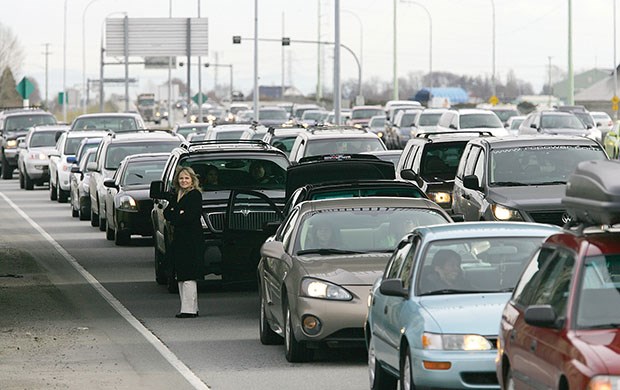Delta wants more details when it comes to how the proposed tax increase for transit will benefit local residents.
"Is there any way you can give us more specifics?" Mayor Lois Jackson asked Mike Buda, executive director of the Mayors' Council on Regional Transportation.
Buda appeared before Delta council Monday night to present highlights from the mayors' council's transportation and transit plan. The plan is contingent on the approval of the proposed 0.5 per cent Metro Vancouver Congestion Improvement Tax, which will be put to voters in a mail-in referendum beginning next month.
Buda said the plan is designed to serve both local and regional needs. He told council that more than 50 per cent of all transit trips, and 76 per cent of commuter trips, by Delta residents take them outside the municipality.
Possible local improvements include a new B-line from Scott Road Station to Newton Exchange via Scott Road and 72nd Avenue; a new rapid bus station at Highway 99 and Highway 17A, as well as more frequent service all day between South Delta and Richmond via Highway 17, and between North Delta and Richmond via Highway 91; upgrades to the South Delta Exchange in Tsawwassen; and a northsouth bike route in North Delta running parallel to Scott Road.
Buda said the proposed plan also includes more frequent trips during off-peak hours with buses running at least every 15 minutes seven days a week.
He said this would eliminate the need for riders to keep track of a bus schedule.
"You don't have to adapt to the transit service, the transit service is there to serve your needs," he said.
The plan also includes upgrades to major road networks, including 56th Street, River Road, Scott Road, 72nd Street and 64th Street.
"There's a lot that is going to happen within months of a 'yes' vote," Buda said, adding that increasing bus services, funding some of the road network upgrades, and walkway and bicycling improvements can all be implemented quickly.
Jackson and Coun. Ian Paton asked about the reinstatement of the 601 bus that had a direct route from South Delta into downtown Vancouver. Buda said the request would be passed along to TransLink.
With referendum ballots set to go out starting March 16, Buda said the mayors' council is working on its post-referendum action plan and would be working with municipalities to set out more detailed plans.
"We need this information out so people can make an informed decision," he said. The proposed 0.5 per cent hike to the sales tax is expected to generate $250 million annually, money that would be earmarked for transit improvements identified in a 10-year, $7.5-billion plan put together by the region's mayors. Senior government funding would also be required.
The tax is expected to cost $125 per resident, according to the Better Transit and Transportation Coalition, which is lobbying for the 'yes' side. The Canadian Taxpayers Association, which is lobbying against the tax, says it will cost $258 a year per for the average Lower Mainland household.
 The Delta chapter of the Council of Canadians, which supports the proposed tax, is holding a presentation and discussion on the issue at the Ladner Pioneer Library on Thursday, Feb. 26 from 7 to 9 p.m. Transportation planner and author Eric Doherty will be the guest speaker.



